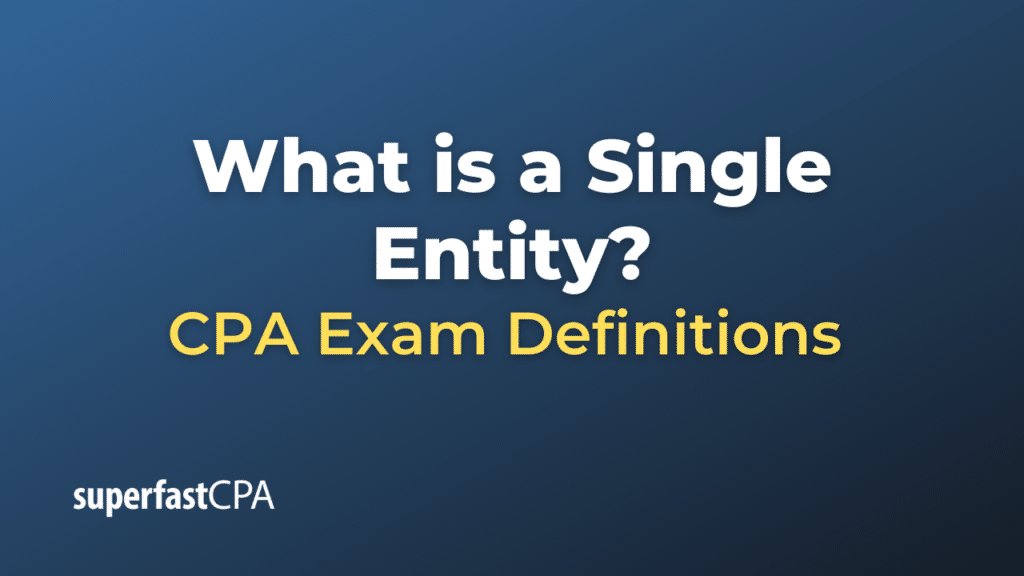Single Entity
In business and legal contexts, a “single entity” typically refers to a standalone business or organization that is recognized as an independent legal person. This means the entity can enter into contracts, own property, sue and be sued, and engage in business activities separate from its owners or stakeholders.
Depending on the jurisdiction, a single entity can take on various forms:
- Sole Proprietorship: This is the simplest business form owned by one person. In many jurisdictions, there is no legal distinction between the owner and the business in a sole proprietorship. This means the owner is personally responsible for all of the business’s debts and obligations.
- Corporation: A corporation is a legal entity separate from its shareholders. It offers limited liability protection to its shareholders, meaning their personal assets are generally not at risk for the corporation’s debts.
- Limited Liability Company (LLC) : An LLC is a hybrid legal structure that combines the limited liability features of a corporation with the tax efficiencies and operational flexibilities of a partnership. Like a corporation, the owners (members) of an LLC are not personally liable for the company’s debts.
- Partnership : In some cases, a partnership, which is typically owned by two or more persons, can be considered a single entity, especially when discussing it in contrast to its individual partners.
The primary benefit of operating as a single entity, especially in the form of a corporation or an LLC, is the limited liability protection it offers its owners. This means that, in most circumstances, the personal assets of the owners or shareholders are shielded from the debts and liabilities of the business.
When the term “single entity” is used in other contexts, such as sports leagues (e.g., Major League Soccer in its early years), it may have a specific meaning related to the structure and organization of the league, wherein the league owns all the teams and player contracts. However, without specific context, the term generally refers to the standalone business or legal entity definitions provided above.
Example of a Single Entity
Let’s explore the concept of a “single entity” through the lens of two hypothetical scenarios:
Scenario 1: Sole Proprietorship
Business: Jane’s Handmade Jewelry
Jane is a talented artisan who crafts handmade jewelry. She decides to start selling her pieces at local craft fairs and online. She establishes her business as a sole proprietorship under the name “Jane’s Handmade Jewelry.”
As a Single Entity:
- Jane’s Handmade Jewelry, as a sole proprietorship, is not legally separate from Jane.
- Any profits she earns are reported on her personal income tax.
- If the business incurs any debts or liabilities (for instance, if someone claims that a piece of jewelry caused an allergic reaction), Jane is personally responsible. This means her personal assets, like her savings or home, could be at risk if the business can’t cover its debts.
Scenario 2: Limited Liability Company (LLC)
Business: TechGuard Security Solutions
Three IT professionals — Alex, Maria, and Ravi — decide to start a cybersecurity consulting firm. Recognizing the potential risks involved in the industry, they decide to set up their business as an LLC, naming it “TechGuard Security Solutions.”
As a Single Entity:
- TechGuard Security Solutions operates as its own legal entity, separate from Alex, Maria, and Ravi.
- The LLC provides limited liability protection. This means that if TechGuard is sued (let’s say, due to a breach in a system they were supposed to protect), the personal assets of Alex, Maria, and Ravi are generally protected. Only the assets of TechGuard would be at risk.
- For tax purposes, unless they choose otherwise, the LLC’s profits and losses pass through to Alex, Maria, and Ravi’s individual tax returns, avoiding double taxation.
These examples highlight the distinctions between different forms of single entities and the implications of choosing one structure over another. While Jane’s Handmade Jewelry is a single entity in the form of a sole proprietorship, it offers no legal separation between the business and the owner. On the other hand, TechGuard Security Solutions, as an LLC, offers a clear legal distinction between the business entity and its owners, providing them with limited liability protection.













